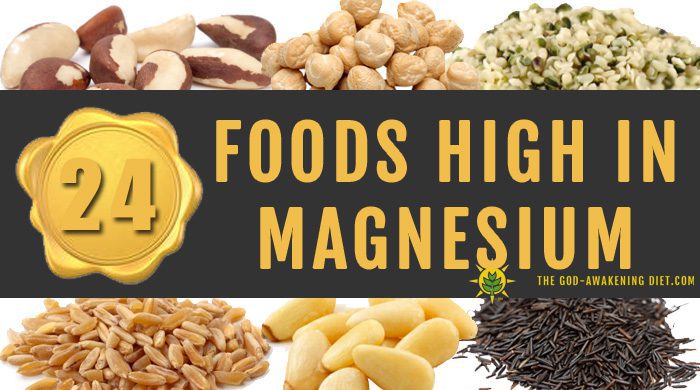24 Foods High In Magnesium

Foods high in magnesium are essential for maintaining health, because magnesium is involved in the operation of over three hundred different enzymes that regulate numerous functions in the body.[1]
The body needs magnesium to make DNA and RNA. Magnesium is electrolyte that supports proper heart rhythm, and muscle and nerve function by transporting calcium and potassium ions across cell membranes.
Proper levels of magnesium in the body support bone and teeth health by regulating the absorption of calcium.
The synthesis of the antioxidant glutathione requires magnesium. The regulation and division of cell growth, maintaining the structure of proteins, and DNA synthesis and repair require glutathione.
Enzymes need magnesium to regulate the breakdown glucose and produce energy in a process called glycolysis. The body also uses magnesium to regulate blood pressure.
The blood contains only 1% of the magnesium in the body. Magnesium plays a critical role in maintaining bone health, so the bones contain a large portion of the magnesium at 50-60%.
The rest is located in soft tissue throughout the body, which supports various enzymes and their numerous functions.
Is important to consume the daily recommended value for magnesium because of the vital role its plays in many crucial functions in the body.
Daily Recommended Value For Magnesium
- Adult females: 310 mg[2]
- Females who are pregnant: 350 – 400 mg
- Females who are breastfeeding: 310 – 360 mg
- Adult males: 400 mg
Foods High In Magnesium
Source: USDA National Nutrient Database – Unless Indicated
The magnesium rich foods are some of the foods on the Dr. Sebi Nutritional Guide »
- Brazil Nuts (whole): 1 cup | 500 mg | 125% DV
- Amaranth Grain: 1 cup | 479 mg | 120% DV
- Pine Nuts: 1 cup | 339 mg | 85% DV
- Quinoa (uncooked): 1 cup | 335 mg | 84% DV
Quinoa (cooked): 1 cup | 118 mg | 30% DV - Wild Rice (uncooked): 1 cup | 283 mg | 71% DV
Wild Rice (cooked): 1 cup | 52.5 mg | 13% DV - Fonio (uncooked): 1 cup | 257 mg | 64% DV[3]
- Kamut (uncooked) : 1 cup | 242 mg | 60% DV
Kamut (cooked): 1 cup | 83 mg | 21% DV - Spelt berries (uncooked): 1 cup | 237 mg | 59% DV
Spelt berries (cooked): 1 cup | 95 mg | 24% DV - Garbanzo Beans (raw): 1 cup | 230 mg | 58% DV
- Hemp Seed: 3 Tbsp | 210 mg | 52% DV
- Hazelnuts (chopped): 1 cup | 187 mg | 47% DV
- Walnuts: 1 cup chopped | 185 mg | 46% DV
- Figs (dried): 1 cup | 101 mg | 25% DV
- Raw Sesame Seeds: 1 ounce | 98.3 mg | 25% DV
- Raw Sesame “Tahini” Butter: 100 grams | 95 mg | 24 DV
- Prunes: 1 cup | 84.5 mg | 25% DV
- Avocado: 1 | 58.3 mg | 15% DV
- Amaranth Greens: 100 grams | 55 mg | 14% DV
- Dates: 100 grams or 4 dates | 54 mg | 14% DV
- Raisins (seeded): 1 cup | 49.5 mg | 12% DV
- Nopales (sliced): 1 cup | 44.7 mg | 11% DV
- Cucumber: 1 | 39.1 mg | 10% DV
- Kale: 100 grams | 34 mg | 8 % DV
- Bananas : 1 medium | 31.9 mg | 8% DV







